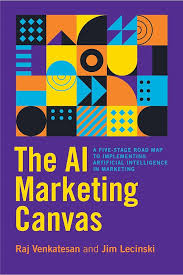White Paper
AI Marketing Canvas: A Framework for Developing Effective AI-Driven Marketing Strategies
Authors:
-
IASR ADMIN
-
IAS-Research.com
Abstract
In today's data-driven world, artificial intelligence (AI) is revolutionizing marketing. AI-powered tools can automate tasks, personalize experiences, and gain valuable insights from customer data. To effectively leverage AI in marketing, a structured approach is essential. The AI Marketing Canvas is a visual tool designed to help businesses plan and execute their AI-driven marketing strategies. This white paper provides a comprehensive overview of the AI Marketing Canvas, its components, and its benefits, with a specific focus on SEO and website optimization.
Introduction
The rapid advancements in AI technology have created new opportunities for marketers to enhance their campaigns and achieve better results. AI-powered tools can be particularly effective in SEO and website optimization, helping businesses improve their search engine rankings and attract more organic traffic. The AI Marketing Canvas can be used to develop a tailored strategy for leveraging AI in these areas.
Use Case: SEO and Website Optimization
-
Problem Definition: Identify specific SEO challenges, such as low search engine rankings, poor website performance, or difficulty attracting organic traffic.
-
Data Inventory: Gather data on your website's performance, including search engine rankings, traffic sources, and user behavior.
-
AI Technologies: Consider using AI technologies such as natural language processing (NLP) for keyword research, machine learning for predictive analytics, and computer vision for image optimization.
-
Target Audience: Define your target audience and their search intent to understand the relevant keywords and topics.
-
Value Proposition: Highlight how AI-powered SEO and website optimization can improve your website's visibility, user experience, and conversions.
-
AI Applications: Identify specific use cases for AI in SEO and website optimization, such as:
-
Keyword Research: Use NLP to identify relevant keywords and phrases.
-
Content Optimization: Analyze your website's content to identify areas for improvement and optimize it for search engines.
-
On-Page SEO: Use AI to optimize on-page elements, such as title tags, meta descriptions, and header tags.
-
Technical SEO: Identify and address technical issues that may be affecting your website's search engine rankings.
-
Local SEO: Optimize your website for local search results using AI-powered tools.
-
-
Marketing Channels: Determine the most effective channels for promoting your website, such as social media, email marketing, and content marketing.
-
Metrics and KPIs: Establish KPIs to measure the success of your AI-powered SEO and website optimization efforts, such as organic traffic, search engine rankings, and conversion rates.
-
AI Implementation Plan: Outline the steps involved in implementing your AI marketing strategy, including data preparation, model development, and deployment.
Conclusion
The AI Marketing Canvas provides a valuable framework for developing effective AI-driven marketing strategies, particularly in the context of SEO and website optimization. By following the steps outlined in the canvas, businesses can leverage AI to improve their search engine rankings, attract more organic traffic, and enhance their overall online presence. contact ias-research.com for details.



